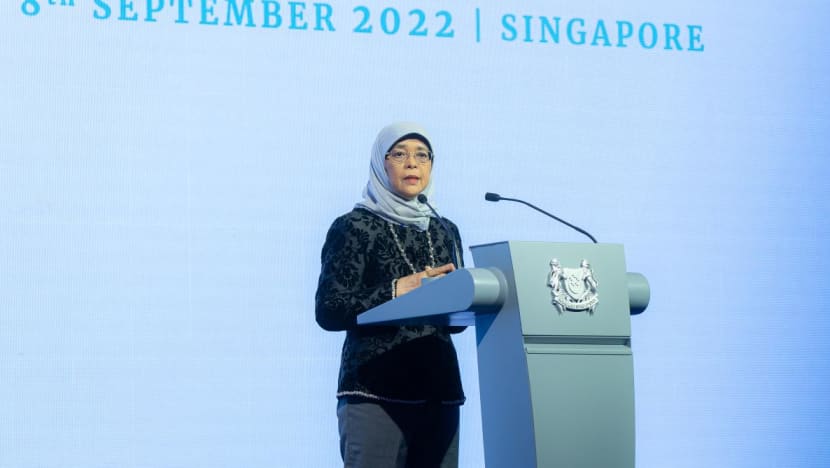Societies cannot survive without the social glue that bonds people together: President Halimah

President Halimah Yacob delivers the opening address of the 2022 International Conference on Cohesive Societies (ICCS) at Raffles City Convention Centre in Singapore on Sep 6, 2022. (Photo: ICCS)
SINGAPORE: Societies cannot survive, let alone thrive, without the social glue that bonds people together, said President Halimah Yacob on Tuesday (Sep 6) at the International Conference on Cohesive Societies (ICCS).
In her opening address at the second edition of the global interfaith event, she noted that the pandemic - and how it has deepened fault lines across the world - serves as a reminder that social cohesion is a necessary condition for collective security.
"National resilience and stability are the result of people working together towards a common cause, united in the face of challenges and threats facing a country," she added.
"Cohesive societies do not exist spontaneously. They are borne of choice and conviction. The pandemic has reinforced this."
It was Mdm Halimah who first came up with the idea for a gathering to discuss faith, identity and cohesion back in 2018.
The inaugural ICCS, organised by the S Rajaratnam School of International Studies (RSIS) think-tank and supported by the Ministry of Culture, Community and Youth (MCCY), took place in June 2019.
This year's conference will be held at Raffles City Convention Centre from Tuesday to Thursday and attended by more than 800 participants from close to 40 countries, including religious leaders, policymakers and civil society practitioners.
Deputy Prime Minister Lawrence Wong is expected to speak on the last day.
ICCS 2022 will examine the same issues as before but through the lens of lessons from the pandemic.
The pandemic was a public health crisis with serious social implications, said Mdm Halimah on Tuesday.
"In a period of heightened social anxiety, tensions rose and in certain cases triggered hate, bigotry and xenophobia. This descended into violence in some places, with reports of hate crimes against persons of Asian ethnicity who were blamed for the spread of the virus," she said.
Related:
Emphasising the need to understand factors contributing to social cohesion, the president pointed to a regional study by the RSIS which found that 69 per cent of those surveyed in Southeast Asia believed that their country was socially cohesive.
The study found that levels of trust and acceptance between people and the social networks they build over time are elements that help strengthen social cohesion, said Mdm Halimah.
It also recommended that the engagement of community and religious leaders and other relevant stakeholders was critical to building cohesive societies.
In view of these findings, initiatives like the Commitment to Safeguard Religious Harmony have become even more relevant, Mdm Halimah added.
The initiative, launched at the first edition of the ICCS, saw religious leaders pledge to be united in promoting the common good, to stand against division and discord, and to build strong bonds across their communities through interactions such as attending each other’s festivals.
More than 750 of Singapore’s religious organisations have affirmed this Commitment, said Mdm Halimah.
"We face common challenges globally as we emerge from the pandemic," she said. "We must continue to create and build safe and open platforms to discuss sensitive issues and work together to strengthen unity and resilience in our societies."
Mdm Halimah added: "This is a time to come together as a family, to recognise the beauty in our diversity and use that to our advantage in tackling greater challenges to come, so that we can build brighter and more cohesive societies for all."














